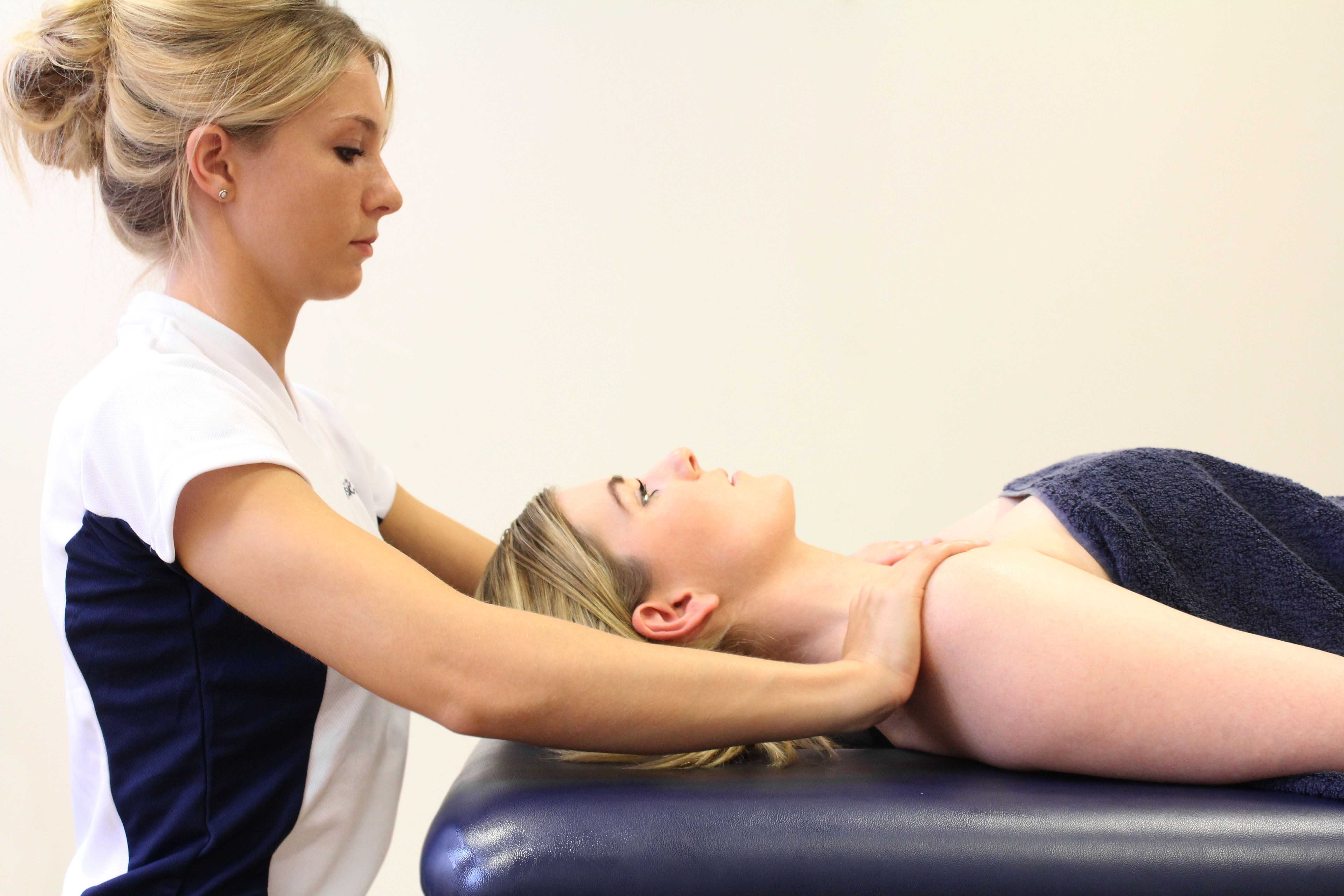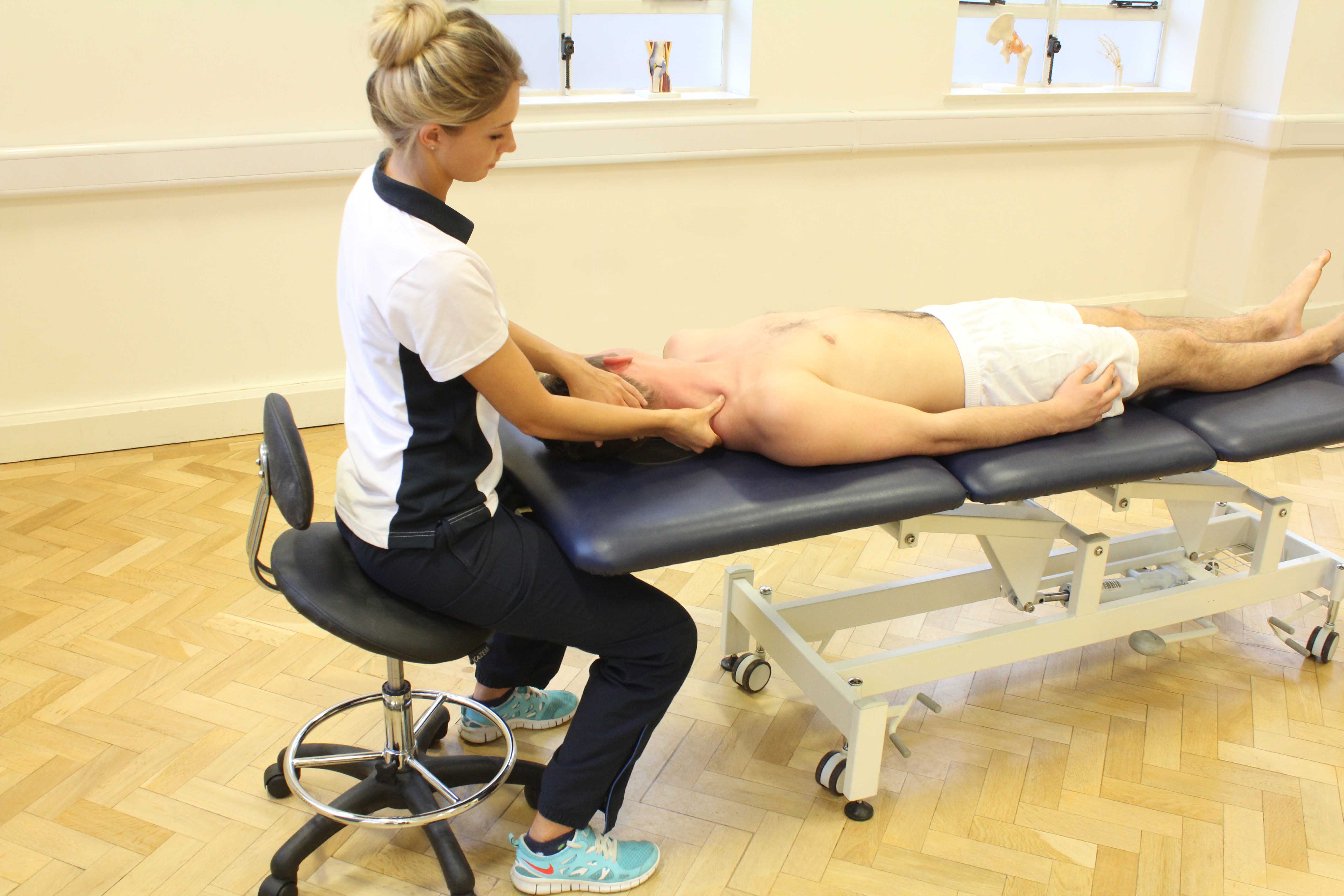Over time, arthritic changes can occur to the joint. The cartilage becomes degenerated which, over time, will cause the two bones to rub together. The joint becomes worn out, larger in size and small osteophytes (bone spurs) can develop causing increased pain and loss of movement. To correct this, an arthroscopic excision is performed, removing the distal end of your clavicle.
 Above: Soft tissue massage of the clavicle and surrounding connective tissues
Above: Soft tissue massage of the clavicle and surrounding connective tissuesPhysiotherapy prior to Clavicle Excision
Physiotherapy prior to clavicle excision is a highly useful and recommended intervention. Physio.co.uk will help to reduce the pain you have and correct any physiological problems acquired helping to improve the movement and function in your shoulder. Treatment options available include:
- Cryotherapy
- Pain management
- Electrotherapy
- Taping and bracing
- Stretches
- Scapular stability
- Strengthening programme
- Home exercise programme
- Advice and surgical management
 Above: Trigger point massage of the muscle and connective tissue around the clavicle
Above: Trigger point massage of the muscle and connective tissue around the clavicleSymptoms following Clavicle Excision
Following clavicle excision, your shoulder will be placed in a protective sling which you will be encouraged to discard within 2-4 days. Common symptoms you may have subsequent to your surgery include:
- Pain
- Stiffness
- Swelling
Physiotherapy following Clavicle Excision
Physio.co.uk will complete a thorough assessment of your shoulder identifying areas of weakness and highlighting specific factors that need treating. We will then develop a personal rehabilitation programme specific to your personal needs and goals. Focus throughout will be on early mobilisation, maintaining this, and improving strength and function.
Weeks 1-3
Initially Physio.co.uk will focus on managing acute symptoms and reducing post operative complications.Your sling will be discarded soon after surgery and early mobilisation will be commenced. Treatment will include:
- Cryotherapy
- Pain management
- Sling management
- Early mobilisation
- Active and passive range of movement exercises
- Soft tissue release
- Electrotherapy
- Range of movement and strengthening exercises for elbow, wrist and hand of affected
- arm
- Rotator cuff Strengthening
- Scapular stability exercises
- Advice and management
Weeks 4-6
After 3 weeks, you will have gained a majority of your movement back and focus will be on attaining full range of movement –specifically overhead movement. Physio.co.uk will continue with a progression of exercises to help prevent contractures and increase the strength of your shoulder. Functional tasks will be integrated within treatment with strengthening activities restricted to below shoulder height. Treatment will consist of:
- Continued passive and active range of movement exercises
- Increased strengthening of rotator cuff and scapular stabilisers
- Soft tissue release
- Begin integration of task specific exercises
- Close chain exercises
- Proprioceptive training
Weeks 6+
Following six weeks of physiotherapy you will have seen a significant increase in movement and strength of your shoulder. Physio.co.uk will intensify rehabilitation so that you are able to return to sports and recreational hobbies as soon as possible. Treatment will concentrate on overhead activities including movement, strength and mobility. Strengthening through range will increase stability at your AC joint and prevent future injuries occurring here. Treatment will include:
- Range of movement exercises to attain full range
- Scapular strengthening in outer range
- Muscular endurance
- Advanced proprioceptive tasks
- Further integration of sports specific tasks
- Advice on long term management
Summary
Your acromio-clavicular joint like other joints, it is susceptible to arthritic changes which can produce pain and lead to reduced movement and function with overhead activities. To help combat this problem a clavicle excision is performed whereby the arthritic damaged bone is removed. Following surgery, Physio.co.uk will develop a comprehensive and specific rehabilitation programme to ensure you regain full mobility and function at your shoulder. Physio.co.uk will endeavour to achieve full return to sporting, recreational and occupational activities with a clear rehabilitation focus on your personal goals.Call Physio.co.uk now on 0330 088 7800 for more information or to book an appointment please contact us.

 0330 088 7800
0330 088 7800


































